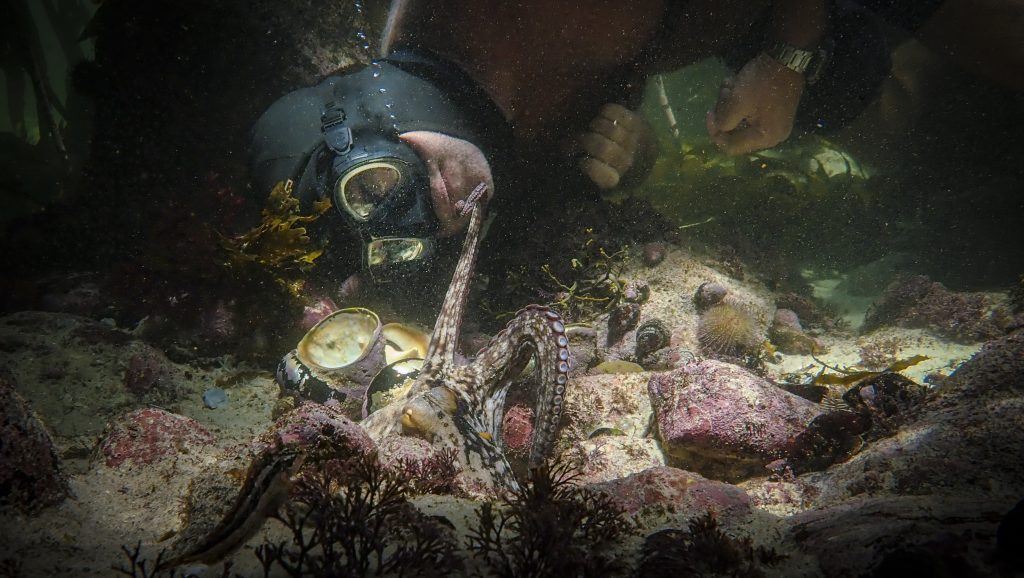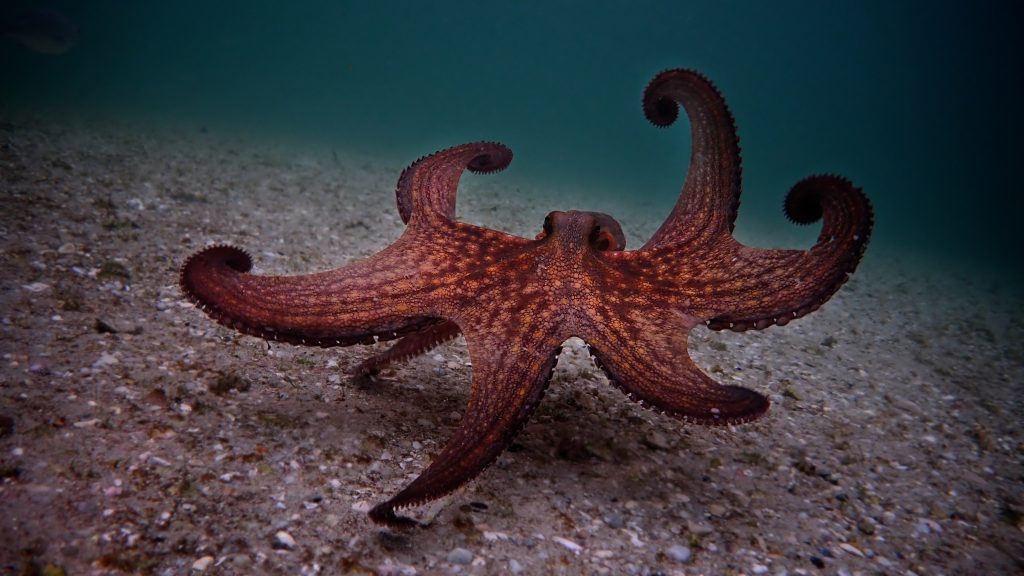April 20, 2021
by Carla Hay

Directed by Pippa Ehrlich and James Reed
Culture Representation: Taking place off the coast of Cape Town, South Africa, the documentary “My Octopus Teacher” features white South African filmmaker chronicling his year-long journey of observing and befriending a female octopus named Rosetta living in a kelp forest.
Culture Clash: The octopus Rosetta frequently encounters dangerous predators, such as pyjama sharks.
Culture Audience: “My Octopus Teacher” will appeal primarily to people interested in nature documentaries that have visually immersive cinematography and emotionally moving examples of how humans and animals can bond with each other.

Nature documentaries about humans who befriend or grow close to animals tend to be about mammals. And in animated films with underwater creatures, the octopus is rarely the star. The documentary “My Octopus Teacher” tells a distinctive and memorable tale of how a filmmaker formed an unusual friendship with an octopus that taught him more about life than he expected. It’s a movie that’s unabashedly sentimental but also thoroughly entertaining and educational.
Directed by Pippa Ehrlich and James Reed, “My Octopus Teacher” was eight years in the making, but the footage in the movie is about how South African documentary filmmaker Craig Foster observed and eventually grew close to a female octopus during an approximately one-year period. Foster named the octopus Rosetta, and he visited her every day in False Bay, off the coast of his hometown of Cape Town, South Africa. Foster, whose specialty is nature documentaries, produced “My Octopus Teacher,” and he was inspired to film in the kelp forests that he remembered playing in as a child.
The documentary’s stunning cinematography by Foster and Roger Horrocks completely immerses viewers in the underwater kelp forest that is Rosetta’s domain. At first, the octopus is wary and mistrustful of Foster, but she eventually figures out that he won’t hurt her, and she learns to trust him. There’s a breakthrough moment when she reaches a tentacle out to him, like a handshake.
And much later, their bond is strong enough where she lets him cradle her in his arms like a baby. There’s very much a “cute” factor to this movie that will delight people of all ages and especially people who have a fondness for animals. What’s also unique about the movie is that, unlike most animal documentaries that focus on a family of animals, “My Octopus Teacher” is only about one animal. It’s mentioned in the film that an octopus, by nature, tends be a loner.
“My Octopus Teacher” shows how the intelligence of an octopus is much higher than a lot of people might think it is. In the documentary, Foster (who gives constant on-camera and voiceover narration throughout the film) says that an octopus has approximately the same intelligence as a dog or a cat. But Rosetta gets herself out of predicaments in such a way that will make people think she’s smarter than the average octopus.
Foster’s underwater excursions were unusual for a documentarian because he refused to wear a wet suit or a scuba tank. As he explains in the documentary, “Having a scuba tank is not optimal for me. I want to be more like an amphibious animal. Instinctively, I knew not to wear a wet suit. If you really want to get close to an environment like this, it helps tremendously to have no barrier to that environment.”
The narration of “My Octopus Teacher” is deeply personal, since Foster tells his story like someone giving testimony about a life-changing experience. Thanks to skillful editing from Ehrlich and Dan Schwalm, footage that’s shown is an effective match to what he recounts in his storytelling. Foster says that around the year 2010, he got burned out from making films in exotic but harsh locations (such as Africa’s Kalahari Desert, where he filmed “The Great Dance”) and was experiencing stress-related anxiety. And so, he decided that he would go back to the kelp forests of his childhood for a more relaxing underwater environment.
As Foster tells it in the documentary, he didn’t expect that he would become so personally attached to this octopus. By his own admission, he became “obsessed” with Rosetta’s well-being and what she was up to on a daily basis. It’s very clear that Foster became emotionally attached to the octopus as someone might be for a pet that doesn’t live in the home.
Of course, life for Rosetta wasn’t all happiness and joy. She was under constant threat from predators, with the most dangerous being pyjama sharks. A nature documentary is almost required to show chase scenes that could end in life or death. And “The Octopus Teacher” certainly delivers on this type of suspense.
There’s also a segment early on the film when Rosetta is scared off because Foster accidentally dropped a camera near her. His sudden lens also spooked her and she ran off and abandoned the den where she was living. Foster than had to learn how to track down an octopus in this vast environment.
He comments in the movie about this investigative mission: “You have to start thinking like an octopus. It’s like being a detective. You just slowly start getting all of your clues together. And then I started to make little breakthroughs.”
Some of the clues involved tracing Rosetta by the type of discarded food she was likely to have left behind. And the strategy works. Foster’s elation at reuniting with Rosetta after a week of not seeing her is almost palpable through the screen. And the octopus’ reaction is also a sight to behold.
“My Octopus Teacher” was absolutely designed to pull at people’s heartstrings. The lively musical score from Kevin Smuts hits all the right emotional buttons. And Foster gets teary-eyed in a few moments of the film that will also make a lot of viewers cry too.
If there’s any main criticism that people might have of the movie it’s that there’s too much narration. And some viewers might think that it’s a bit too anthropomorphic when Foster (who is not a scientist) tells viewers what Rosetta was feeling. However, the flip side to that argument is Foster spent a year developing a close bond to this octopus, so he’s entitled to his opinion. Some cynics might also snipe that the documentary is a promotional vehicle for the Sea Change Project, a diver community that Foster co-founded and which is mentioned in the movie’s epilogue.
Even without the sentimentality of this story, “My Octopus Teacher” has lessons in humility that people can learn when it comes to human beings’ tendency to underestimate the intelligence of other animals. The end of the movie shows how Foster’s friendship with Rosetta affected his relationship with his son Tom, who was a teenager at the time this documentary was filmed and who appears briefly in the movie. “My Octopus Teacher” is such an emotionally stirring film, it’s bound to have an effect on viewers too.
Netflix premiered “My Octopus Teacher” on September 7, 2020.
